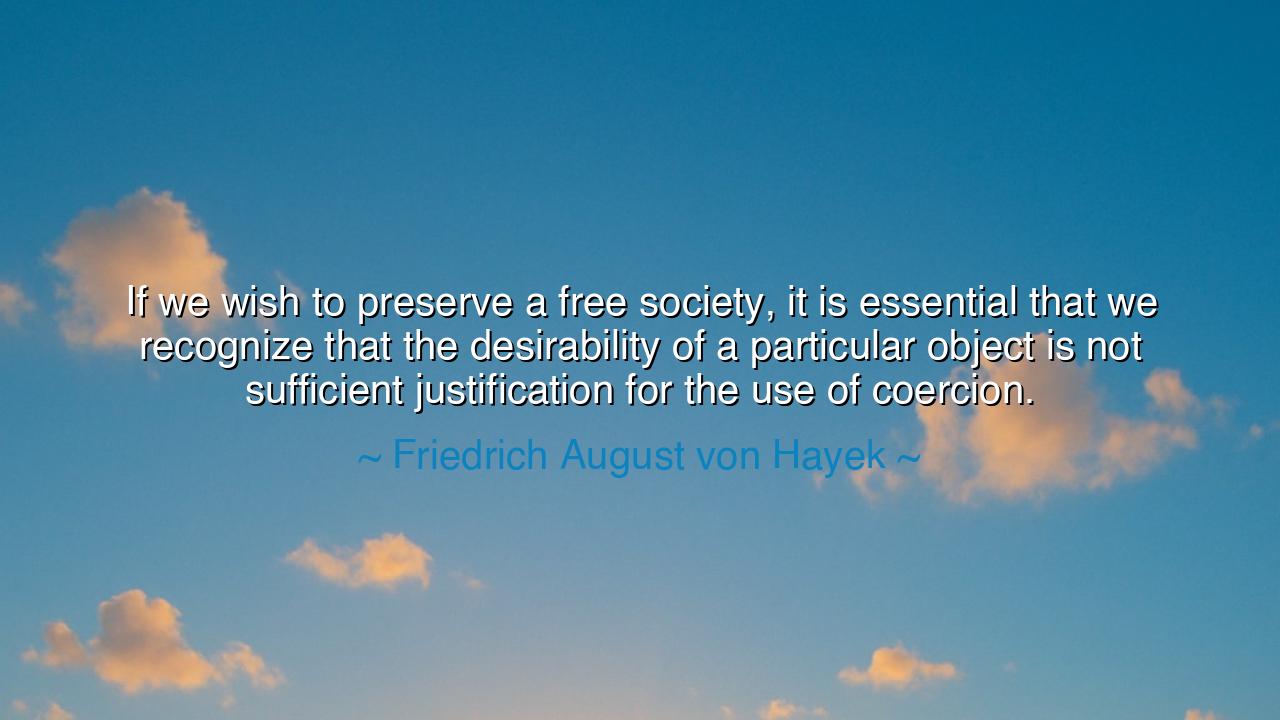
If we wish to preserve a free society, it is essential that we
If we wish to preserve a free society, it is essential that we recognize that the desirability of a particular object is not sufficient justification for the use of coercion.






Hear the solemn words of Friedrich August von Hayek, a defender of liberty against the creeping shadow of tyranny: “If we wish to preserve a free society, it is essential that we recognize that the desirability of a particular object is not sufficient justification for the use of coercion.” In this saying, he unmasks one of the oldest temptations of humanity—that because something appears good, noble, or useful, we may compel others to submit to it by force. Yet, as Hayek warns, the road to slavery is paved with such justifications. For the seed of coercion, once planted, grows quickly into a tree of despotism.
The ancients themselves knew this peril. Plato’s guardians sought to order the lives of citizens for what they deemed the “greater good,” yet Aristotle warned that tyranny often cloaks itself in the language of virtue. Rome too, in its final centuries, saw rulers justify ever-greater powers by declaring their necessity for security or prosperity. But when men are compelled, when freedom is traded for promises, the soul of society withers, even if the object desired was once considered worthy. Thus Hayek reminds us: the freedom to choose must never be sacrificed upon the altar of imposed desirability.
History gives us grim examples of this truth. In the Soviet Union, leaders proclaimed the desirability of equality, of shared prosperity, of an end to want. Yet, to impose these goals, they wielded the iron hand of coercion—seizing property, silencing dissent, and crushing freedom. The result was not utopia but famine, fear, and the death of millions. The object may have been desirable, but the method—coercion—corrupted it, proving Hayek’s eternal warning: that freedom dies when power claims virtue as its excuse.
But there are brighter examples as well. Consider the birth of the United States, where leaders, though imperfect, resisted the urge to impose every good they desired by force of government. Instead, they built a framework where freedom of choice reigned, trusting that liberty, though messy, bore greater fruit than compulsion. The result was a flourishing society where innovation, faith, and enterprise thrived not by decree, but by the voluntary actions of free people. This is the spirit of Hayek’s teaching—that a free society is preserved not by constant compulsion, but by restraint, humility, and trust in freedom.
The meaning, then, is clear: the moment we say, “This goal is so important that we must force it upon all,” we place one foot on the path of tyranny. No matter how noble the object, it cannot justify the loss of choice. A garden grown under the lash may yield fruit, but it is bitter; only a garden tended by free hands will bear fruit worth eating. Hayek calls us to remember that coercion destroys the very liberty upon which lasting prosperity and peace depend.
The lesson for us, O listener, is to cultivate vigilance. When voices cry out that some great good must be achieved at any cost, question the means. Ask whether freedom is being sacrificed for the illusion of gain. Defend the principle that choice, not compulsion, is the soil of human dignity. Live this truth not only in the realm of politics but in the daily dealings of life—guide, persuade, and inspire, but do not force. For every small act of respecting freedom strengthens the larger fabric of a free society.
Therefore, let Hayek’s words echo in our memory: “The desirability of a particular object is not sufficient justification for the use of coercion.” Let this be a shield against the creeping tide of tyranny, a torch to light the path of liberty, and a reminder that freedom, once lost, is seldom regained without blood and sorrow. Better to guard it now, with wisdom and restraint, than to mourn its absence later.
And so, remember this truth as law for every generation: the greatest test of a free society is not whether it can pursue what is desirable, but whether it can resist the temptation to compel others in the name of that desire. For in that restraint lies the true strength and endurance of liberty.






AAdministratorAdministrator
Welcome, honored guests. Please leave a comment, we will respond soon